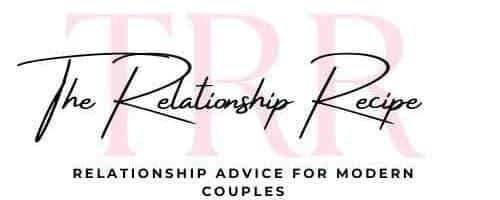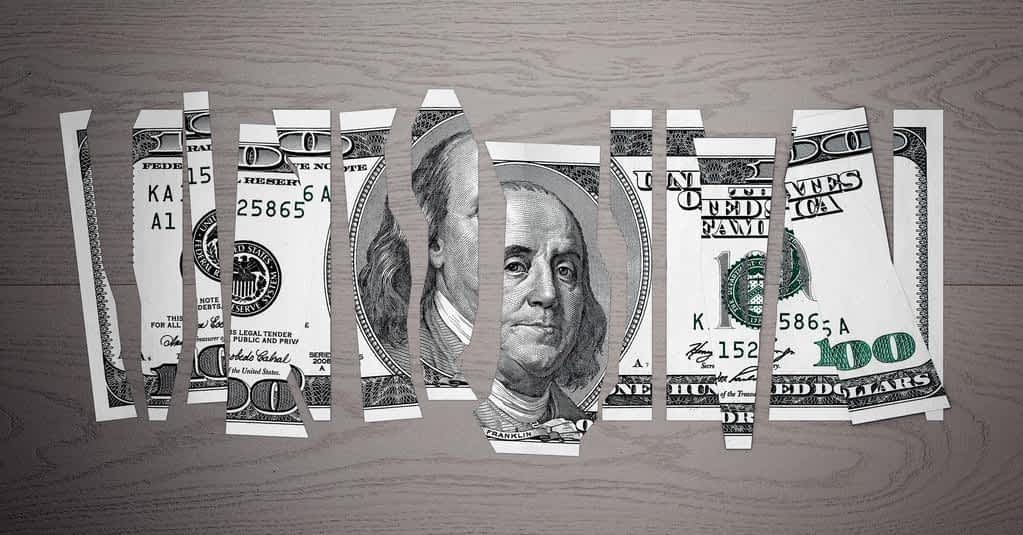Empathic Rupture: When the Essential Bond of Empathy Breaks
When I read an article about empathic rupture by Dr Psych Mom, I was intrigued.I thought of times during my life when I’ve experienced examples of empathic rupture because of other people’s empathy deficit. Oddly, the first thought I had was not with my husband, (I’ll get to that in a minute,) but an incident with my GP doctor, which highlights the fact that you don’t have to be married to someone to experience this. It can happen in any relationship and destroy it.

Key Highlights:
- What really breaks the emotional thread between two people, and how easily it can happen.
- The silent moments that damage trust more than loud arguments ever could.
- Why “I didn’t mean it like that” might not be enough to fix what’s been broken.
- How small, everyday dismissals can quietly dismantle closeness over time.
- The hidden cost of not feeling seen, and how it reshapes relationships permanently
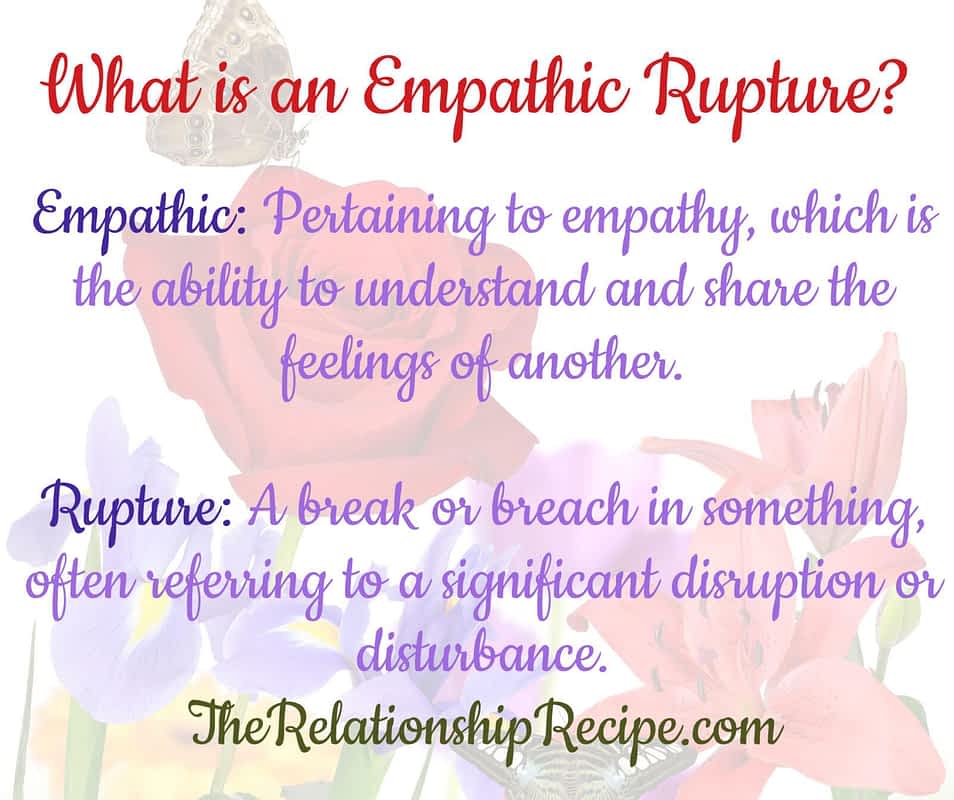
My Doctor’s Failure to Empathize
I’d been seeing my GP for years. At my last visit, I had a list of health concerns, but the one that was driving me crazy (and I mean literally) was intense itching in one spot on my arm. No redness, no visible irritation… until I scratched it raw. I was bleeding from it.
He must’ve been having a bad day.
When I explained how severe it was, he shrugged and said, “How about try not scratching it?”😫
That was my last visit with him. I switched to a woman doctor after that. Sure, doctors have bad days too, but that was beyond uncalled-for. His empathy deficit shattered what had been a years-long doctor-patient relationship. That was it took.
He never helped with the issue. It was like I hadn’t said anything at all. That’s what an empathic failure looks like outside of an intimate relationship.

The Empathic Rupture in My Marriage (and this was a doozy)
I was 9 months pregnant with our second child, my daughter. I was home alone with my son, who wasn’t even a year old, when my water broke. My contractions were about twenty minutes apart then.
Husband was at my dad’s place, one town over, 20 minutes away, drinking beer. I called and told him the news, thinking he’d come home quickly, since – you know – I was having our baby?
I waited.
He didn’t show.
I called again.
By then, my contractions were five minutes apart. I called my mom, desperate for someone—anyone—to come watch our 9-month-old son and get me to the hospital. I was panicking, crying, on my knees by the time my husband finally walked through the door.
I was terrified. Terrified of giving birth alone. Terrified of having my daughter right there on the bedroom floor.
And then, as if the night couldn’t get worse, we got to the hospital, and the front doors were locked. I dropped to my knees again, now screaming. Thankfully, a security guard saw me and rushed over with a wheelchair. I gave birth less than 5 minutes later.
I won’t even get into the resentment this has built over the years. The fact that he risked my life and our daughter’s, just to keep drinking with my dad, is something I’ve never been able to fully move past. I’m sure he’s long forgotten that night. But I haven’t. I can’t. I was left feeling abandoned, dismissed, and unimportant.
The damage from that failure to empathize, in one of the most critical, vulnerable moments of my life, was beyond repair. It shattered something between us. I could never see him the same way again. That night made the decision for me: I wasn’t going to have any more children with him.
I never told him what that night really did to me. Not even when I asked for a divorce. Reopening that wound felt like ripping off an old scab.
For me, that moment: him ignoring the panic, the pain, the risk, was the ultimate empathic rupture. I never truly forgave him. Even now, years later, it still breaks something inside me when I think about it. The sadness. The rage. The disbelief.
It was soul-crushing.
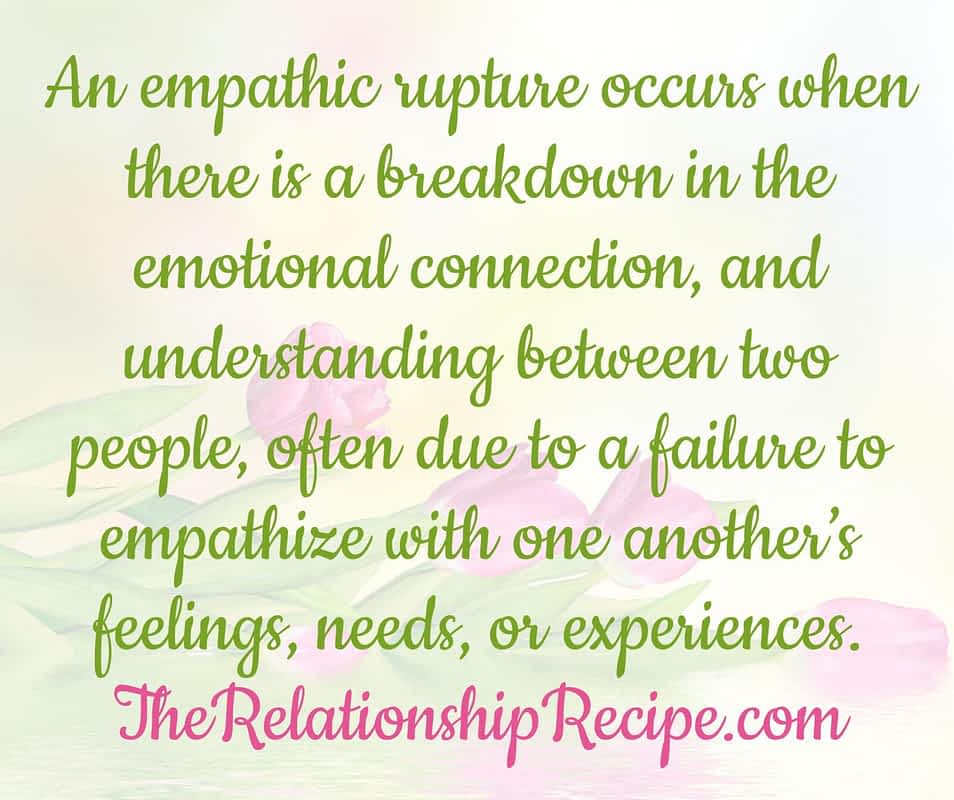
How an Empathic Rupture Affects Relationships:
These ruptures don’t always come from big blowouts. Sometimes, they’re quiet. A missed cue. A cold response. A moment when you needed understanding and got silence instead. Let’s talk through what these moments really look like, why they hurt so much, and how to begin healing from them.
🚩1. You Feel Disconnected and Alone
When someone close to you doesn’t “get” how you feel (or worse, seems to dismiss it altogether) it hits hard. You might start to feel invisible, like your emotions are too much, or not worth the other person’s attention. This failure to empathize from another person who is supposed to care about you, can leave you feeling isolated, even when you’re not physically alone. It’s not just about being misunderstood, it’s not being emotionally held when you needed it most.
That’s an empathic rupture. It’s when empathy breaks down, and instead of closeness, there’s a quiet wall going up between you.
🚩2. Your Feelings Are Overlooked or Dismissed
Everyone wants to feel validated; to hear “I get why you’re upset,” or “That sounds really hard.” But when the other person fails to acknowledge or validate what you’re going through, it creates an empathy deficit. You may feel hurt, frustrated, or even start questioning whether your emotions are valid at all.
This kind of empathic failure might come from someone trying to fix things too quickly, or brushing past your feelings because they’re uncomfortable. But the impact is the same – you’re left holding your pain alone.
🚩3. Miscommunication Pulls You Apart
Sometimes, the rupture happens not because someone meant to hurt you, but because words got twisted or intentions were misread. You might say, “I’m overwhelmed,” and they hear it as “I’m blaming you.” That gap between what’s said and what’s understood becomes fertile ground for empathic rupture.
Miscommunication doesn’t just confuse, it makes you feel unseen. Like your inner experience was lost in translation. And if it keeps happening, it chips away at trust.
🚩4. You Start to Question Trust
Empathy builds trust, little by little, every time someone shows up emotionally for you. But when your emotional needs are ignored, dismissed, or mocked, trust takes a hit. It’s a breach of trust that doesn’t always come from betrayal, but from absence. The absence of care. Over time, repeated failure to empathize can erode the very foundation of your relationship. You might start to think: “Can I even count on this person anymore?”
🚩5. You Shut Down to Protect Yourself
When dealing with another person’s empathy deficit, you may find yourself pulling back emotionally. This isn’t about being cold, it’s emotional survival. Emotional withdrawal often comes after repeated hurts, when opening up starts to feel like setting yourself up to be wounded again.
If you’ve ever stopped sharing your deeper thoughts or feelings with someone, not because you don’t care, but because you don’t feel safe, that’s a sign you’re reacting to an empathic failure. You’re doing what you can to protect your heart.

Everyday Situations That Can Lead to an Empathic Rupture
A failure to empathize can happen in all kinds of relationships and at moments you might not expect. These moments often show up when emotional safety, or sensitivity, is needed most, when you’re looking for understanding, and instead, you’re met with something that feels cold, dismissive, or just… off.
💡Here are some examples of an empathic rupture:
🚩1. High-Stress Situations
When life feels overwhelming, during a crisis, a deadline, or a family emergency, people may struggle to offer empathy. They’re tapped out, running on fumes, and their response may come off as harsh or indifferent.
Example of empathic rupture: You reach out during a meltdown, and they snap at you instead of offering support.
🚩2. Conflict and Disagreements
Arguments can shut empathy down fast. When emotions run high, it’s easy to get defensive or say things you don’t mean.
Example of empathic failure: You try to express how you feel, but the other person cuts you off or invalidates your experience, leaving you feeling unheard and hurt.
🚩3. Moments of Vulnerability
Opening up is a risk. When someone shares something deeply personal, and the other person has an empathy deficit, it stings.
Example of empathy deficit: You reveal something painful, and they respond with a joke or change the subject. Suddenly, it doesn’t feel safe to share anymore.
🚩4. Routine Interactions
Not all ruptures are dramatic. Sometimes, it’s the slow drip of being ignored or brushed off in daily life.
Example of a failure to empathize: You’re telling a story, and they’re glued to their phone. It might seem small, but it builds up over time.
🚩5. Major Life Changes
Big life transitions, like moving, losing a job, having a baby, or death of a loved one, can shake up emotional balance. In these times, the need for empathy is high, but it can also be harder to give.
Example of empathic failure: You’re struggling with a new phase of life, and they don’t check in or offer support, leaving you to carry it alone.
🚩6. Unmet Expectations
We all carry quiet hopes about how others will show up for us emotionally. When those expectations aren’t met, the disconnect can be painful.
Example of empathy deficit: You thought they’d be there on a tough day, but they weren’t. And they didn’t even ask how you were doing.
🚩7. Emotional Burnout
People who give a lot, caregivers, parents, partners, can reach a point where there’s just nothing left to give emotionally.
Example of failure to empathize: You reach for comfort, and they pull away, not because they don’t care, but because they’re depleted.
🚩8. Cultural or Value Clashes
When people come from different backgrounds or belief systems, empathy sometimes gets lost in translation.
Example of empathic rupture: You open up about something meaningful to you, but the other person doesn’t understand or brushes it off due to different values.
🚩9. Lack of Communication Skills
Not everyone knows how to listen with presence. Poor listening, interrupting, or giving unsolicited advice can lead to disconnect.
Example of empathic failure: You’re mid-sentence, and they talk over you. You feel invisible.
🚩10. Mental Health Issues
Depression, anxiety, or trauma can impact a person’s ability to empathize, even with the best intentions.
Example of empathic rupture: You try to connect, but they’re emotionally shut down, leaving you confused or rejected.
🚩11. Routine Neglect
Even without conflict, emotional neglect can quietly wear down a relationship.
Example of failure to empathize: Days or weeks go by without meaningful emotional contact, and you start to feel forgotten or unimportant.
🚩12. Power Imbalances
In relationships with a clear imbalance (like a boss and employee, or a controlling partner) it can be hard for the person with more power to see the other’s emotional reality.
Example of empathic failure: You express a concern, and they dismiss it because they “know better.”
These situations are just a few examples of an empathic rupture can easily happen and how it leaves behind a sense of distance, hurt, or even betrayal. Whether it happens suddenly or slowly over time, the pain is real.

Examples of Empathic Rupture in Relationships
Empathic failures can happen in all types of relationships – romantic, family, professional, and even therapeutic. These moments often carry more weight than we realize. Below are some examples of empathic rupture in relationships that might show up, and the emotional ripple effect empathy deficit can cause.
💥1. Romantic Relationship
Scenario: You come home feeling overwhelmed after a tough day, hoping for comfort. Instead, your partner says, “You’re overreacting. It’s not that big of a deal.”
Impact: That simple dismissal cuts deep. You feel invalidated, unseen, and alone. A moment that could have brought you closer instead creates emotional distance – a clear example of empathic rupture.
💥2. Parent-Child Relationship
Scenario: A teenager nervously opens up about their fear of failing an upcoming exam. The parent replies, “Just try harder and stop worrying so much.”
Impact: The teen feels brushed aside. Instead of being supported, they feel criticized. This kind of empathy deficit chips away at trust, making it harder for them to be open next time.
💥3. Friendship
Scenario: You share something exciting; maybe a new job or a personal win. But your friend barely reacts and quickly shifts the conversation back to their own problems.
Impact: You feel invisible, like your joy didn’t matter. That quiet disappointment is another example of empathic rupture, and over time, these moments can add up to emotional withdrawal.
💥4. Workplace
Scenario: An employee finally speaks up about feeling overwhelmed by their workload. The manager shrugs it off with, “Everyone’s busy. You just have to deal with it.”
Impact: That lack of support stings. The employee feels undervalued and unheard – a clear empathy deficit. When leaders fail to acknowledge their team’s emotions, it doesn’t just hurt morale, it creates lasting disconnection.
💥5. Therapeutic Setting
Scenario: A client bravely shares a traumatic memory, and the therapist responds with a detached, clinical remark like, “That sounds challenging.”
Impact: The client suddenly feels emotionally abandoned. In what should be the safest space, they feel misunderstood. This type of failure to empathize can seriously damage the sense of safety with your therapist and stall healing.
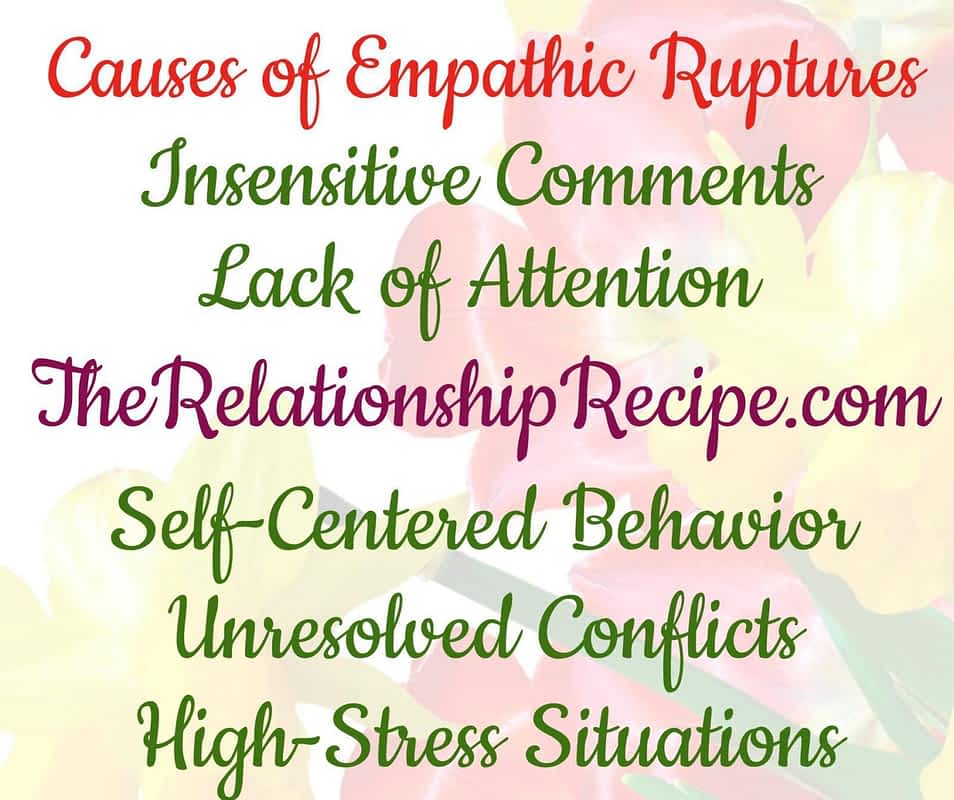
Steps for Restoring Relationships After an Empathic Failure
When an empathic failure happens, it can leave behind a heavy silence. Maybe you felt shut down. Maybe you were the one who unintentionally caused the hurt. Either way, it’s possible to find your way back to a healthy relationship again.
Here are the steps to help you repair the bond and restore trust after an empathic rupture:
✔️1. Acknowledge the Rupture
The first step is to face what happened. Don’t brush it under the rug. Say it out loud: “Something between us felt off.” Recognizing the empathic failure shows the other person that you’re not ignoring their pain. It tells them, I see the break, and I care enough to name it.
Even if you don’t fully understand it yet, acknowledging the disconnect begins the healing.
✔️2. Open the Door to Honest Conversation
Have a calm, open-hearted conversation about what happened. Ask questions like, “Can you help me understand how that moment felt for you?” or “What was going on for you when that happened?”
This isn’t about defending yourself, it’s listening to their emotional truth. Giving space for both sides to speak can turn a failure to empathize into a chance for deeper understanding. These talks can be raw, but they’re necessary.
✔️3. Show Real Empathy
This is where you slow down and really feel with the other person. You don’t need to fix it or agree with everything, they just need to know you get how it affected them. Say things like, “I can see how much that hurt,” or “You had every right to feel that way.”
Empathy is about presence, not perfection. It’s the antidote to the empathic failure that caused the rift in the first place.
✔️4. Apologize from the Heart
A real apology doesn’t include “but” or excuses. It sounds like, “I’m so sorry I hurt you,” or “I didn’t mean to dismiss your feelings, but I understand that I did, and I regret it.”
Taking responsibility is powerful. It doesn’t make you weak, it makes you trustworthy. A sincere apology can soften walls and create space for healing.
✔️5. Work Toward a Solution Together
Ask, “What would help us feel more connected going forward?” or “How can I better support you next time?”
This step is about repair: creating new ways to communicate, respond, and care. Maybe it means slowing down more often. Maybe it’s about checking in emotionally. Whatever it is, it’s something you figure out together.
By doing this, you not only fix the current issue, you reduce the chances of another empathic failure happening down the line.
✔️6. Rebuild Trust Over Time
Trust doesn’t snap back overnight. It’s rebuilt slowly, through small, steady moments of showing up and being emotionally available.
Keep the lines of communication open. Stay curious about how the other person feels. Be consistent in your empathy, not just during the hard moments, but in the quiet, everyday ones, too.
Every time you show up with care, you send the message: You matter. I see you. I’m here.
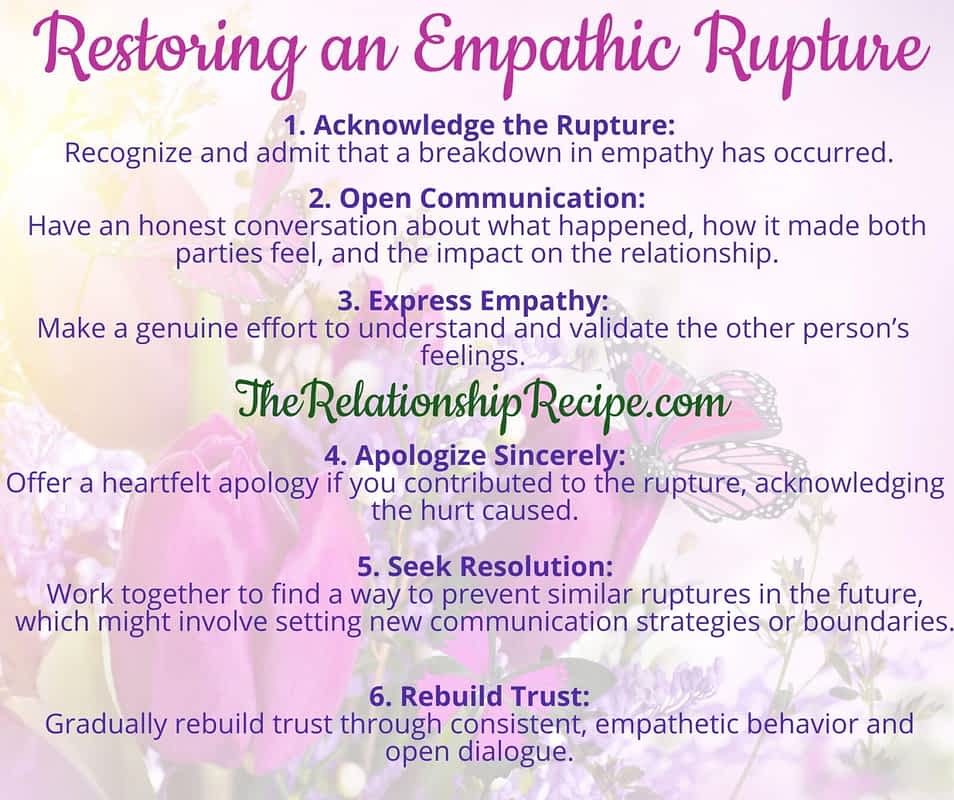
Final Thoughts
Empathic ruptures are a part of being human. Whether it’s a one-time failure to empathize or a slow buildup of everyday disconnects, these moments can leave deep marks on our hearts, but they don’t have to be the end of the story.
What matters most is what happens next. When we recognize an empathic failure and choose to lean in instead of pulling away, we open the door to healing. Repairing a rupture takes effort and vulnerability, but it also builds emotional resilience and deeper trust.
If you’ve experienced an empathy deficit from someone who is supposed to care about you, know this: it’s okay to speak up. It’s okay to ask for more. And if you’ve been the one who missed the mark, there’s real strength in owning that and making it right.


This post may contain affiliate links. I earn from qualifying Amazon purchases at no extra cost to you. This content is for informational purposes only and is not a substitute for professional advice. Read full disclaimer.
Thank you for reading this post, don't forget to subscribe!
